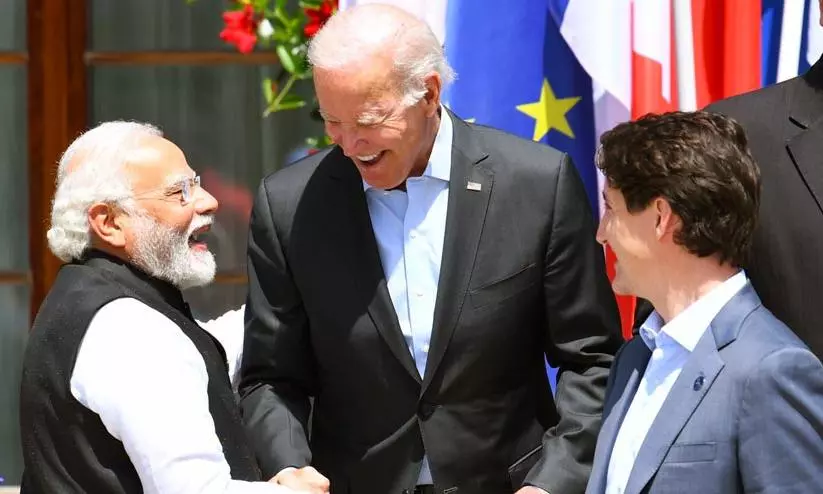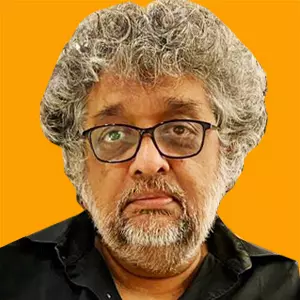
- Home
- India
- World
- Premium
- THE FEDERAL SPECIAL
- Analysis
- States
- Perspective
- Videos
- Sports
- Education
- Entertainment
- Elections
- Features
- Health
- Business
- Series
- In memoriam: Sheikh Mujibur Rahman
- Bishnoi's Men
- NEET TANGLE
- Economy Series
- Earth Day
- Kashmir’s Frozen Turbulence
- India@75
- The legend of Ramjanmabhoomi
- Liberalisation@30
- How to tame a dragon
- Celebrating biodiversity
- Farm Matters
- 50 days of solitude
- Bringing Migrants Home
- Budget 2020
- Jharkhand Votes
- The Federal Investigates
- The Federal Impact
- Vanishing Sand
- Gandhi @ 150
- Andhra Today
- Field report
- Operation Gulmarg
- Pandemic @1 Mn in India
- The Federal Year-End
- The Zero Year
- Science
- Brand studio
- Newsletter
- Elections 2024
- Events
- Home
- IndiaIndia
- World
- Analysis
- StatesStates
- PerspectivePerspective
- VideosVideos
- Sports
- Education
- Entertainment
- ElectionsElections
- Features
- Health
- BusinessBusiness
- Premium
- Loading...
Premium - Events

As the skirmish with Canada shows, under the carefully cultivated James Bond image is an Indian-style Inspector Clouseau bungling his way through world stage
So there is a ‘man in the middle’ in the Canada-India face off over the mysterious killing of Hardeep Singh Nijjar, the leader of the Khalistan Tiger force, this June, in Surrey, British Columbia.
It is the United States of America, the lead member of the Five Eyes, the world’s most cohesive, and deep-rooted intelligence gathering apparatus, consisting also of Canada, the UK, Australia and New Zealand.
Last Friday, US National Security Adviser Jake Sullivan took a deliberate step forward to speak for Canada by declaring that America and Canada were in lockstep on this matter: “As soon as we heard from the Canadian Prime Minister publicly about the allegations, we went out publicly ourselves and expressed our deep concern about them, our support for a law enforcement process to get to the bottom of exactly what happened and to ensure that the perpetrators are held accountable.”
US Secretary of State Antony J Blinken has also publicly raised his voice, saying, “We want to see accountability, and it's important that the investigation runs its course and leads to that result.”
Indian intelligence under scrutiny
The heft that Sullivan and Blinken bring to the situation — coming close on the heels of drip irrigation-style leaks to the Canadian broadcaster CBC that Canada had based its charges against India on human intelligence as well as signals intelligence, and that parts of the signals intelligence had in fact come from a Five Eyes ally — blows a mighty hole in the theory floated in some quarters that Canadian Prime Minister Justin Trudeau has been talking through his hat.
More sinisterly for India, this is the clearest indication that New Delhi has been under intelligence scrutiny over the past few years. The spread of it may not be limited to Five Eyes but, rather, could extend to the Fourteen Eyes, which includes European countries like Germany and places where there is substantial Sikh diaspora. That scrutiny may well have outed other operations of a similar kind and it is very probable that New Delhi has consistently ignored these signals.
We know now that Canadian National Security Adviser Jody Thomas made two frantic trips to New Delhi specifically to flag the issue. Once between August 16 and 19, and soon thereafter between September 6 and 11. The fact that she spent such a long time in Delhi indicates either some amount of cold shouldering or futile persuasion which must have led to Trudeau and US President Joe Biden bringing it up with Prime Minister Narendra Modi.
It is a gang-up, clearly, and probably the biggest foreign policy challenge for India, given the background of a tide of international litany on democratic backsliding and authoritarianism.
Stout denial by MEA
Yet, the Ministry of External Affairs (MEA) persists with the denial that no information has been shared. That is because the matter is now significantly above the pay grade of the spokesman of the MEA and his lightweight political boss, S Jaishankar, who can only take the Rajya Sabha route to Parliament.
The faecal matter being slung from Washington and Ottawa is aimed elsewhere, not at the MEA. The ministry is only carrying the can for the klutzy policy excesses of the Research and Analysis Wing (RAW). It is significant that the previous head of the RAW was Punjab cadre IPS officer Samant Goel, who was given not one but two extensions, most probably for honing this policy.
The question arises — could he have done this alone or with backing from other quarters? The chickens are now openly coming home to roost, proving clearly that under the super sleuthing and all the carefully cultivated James Bond-type image, it is really Indian-style Inspector Clouseau bungling his way through the world stage. Ultimately, it is a truism that Brampton, Canada, for instance, is no Balakot, Pakistan. The Pakistanis will be sure to rub this in.
What does Five Eyes want?
As Jaishankar does his round of special pleadings in New York and Washington, even while a chorus of double-standards by the West is raised domestically, the question arises: Where is the end-point and what does Five Eyes want other than the publicly stated goal of bringing the perpetrators of the Nijjar killing to justice?
Trudeau has told the New York Times that he would like to see “a number of people thrown in jail,” plus “a series of lessons learned and changes made to the way Indian intelligence services operate.”
There, you have it. It promises to be a long and sordid saga.
Consider the information that has been placed before us: According to the CBC, the Canadian government has both human intelligence and signals intelligence indicating the involvement of Indian government officials in the Nijjar killing. That “human intelligence means people coming forward and talking about it”. And that “some of the signals intelligence came from a Five Eyes ally”, which means the Five Eyes ally is aware of the evidence backing this case and therefore can confirm its own views on the veracity of these allegations.
So, they “know” conversations that went on between the Indian diplomats and other members of the Indian government, and some of the people who are closer to the actual crime. More significantly, it has been claimed that in none of the talks between Canadian and Indian officials did the latter deny these allegations.
Damning picture
Taken together it is a pretty damning picture. The US and Canada are joined at the hip when it comes to security. Washington provides its northern neighbour the intelligence cover in much the same way India provided it to Bhutan. Five Eyes has the smoking gun, and most of the suspects are in the line-up.
Does it mean that one or more of the killers or the getaway drivers are already in Canadian custody and they have sung like pet canaries? The Canadians seem to be implicating three different sets of people in the information loop on the wet job – Indian diplomats, other members of the Indian government, and some people who are closer to the actual crime, the cutouts.
Obviously, the Five Eyes intelligence scrutiny raises questions both on the quality of encryption of Indian secure communications and protocols followed by our security agencies abroad. If CBC’s version were to be believed, Indian agents’ fingerprints were pretty much all over the crime scene in such a manner as to call for an explanation.
The most curious and unexplained part of the episode is Nijjar’s son’s revelation that his father was in touch with the Canadian intelligence agency before he was killed. Could they have prevented it? Or was it some kind of a set up? Intelligence agencies do not usually come clear on aspects like this.
With the stepping in of intelligence agencies in this matter, much of the scenes will go behind the scenes, and what we will get is posturing on both sides. It is unlikely that the source and nature of the intelligence will be shared publicly. That only happens in India, as it happened when the then army chief of Pakistan General Pervez Musharraf’s calls to Lt Gen Mohammed Aziz, his chief of staff, were outed during Kargil.
Arvind Dave was the RAW chief. He could have prevented the transcripts from being made public. It had already been shared with the Americans, and they needed no public convincing. It was done to play to the domestic audiences, to stave off criticism that Kargil was the result of mollycoddling Pakistan when then Prime Minister Atal Bihari Vajpayee visited Lahore. That source of intelligence immediately dried up when the transcript went public.
It is astonishing that the Indian government has, at the highest levels, consistently misread the signals and allowed this to spiral out of control. If this is black-ops and a botched-up one at that, there will be a heavy price to pay. Increased scrutiny of our intelligence operations will have its own ramifications on our diplomatic posturing.
(The writer, a senior journalist who writes on foreign policy, is the author of ‘Dead End: The Minister, the CBI, and the Murder that Wasn’t’.)
(The Federal seeks to present views and opinions from all sides of the spectrum. The information, ideas or opinions in the articles are of the author and do not necessarily reflect the views of The Federal.)


